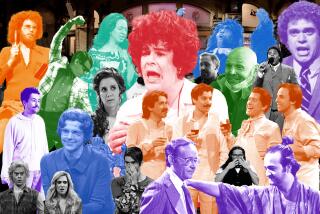Ballads, Broadway and goofy fun all have a place in these songs in the Emmy spotlight

Three of the year’s top songs written for the small screen actually have a Broadway flair, each composed for a musical theater set piece. Two songs written for “Ted Lasso” are earnest ballads, and on the other end of the spectrum is the class clown of this year’s Emmy nominees — Weird Al Yankovic. But even his song, like many of the others, is personal.
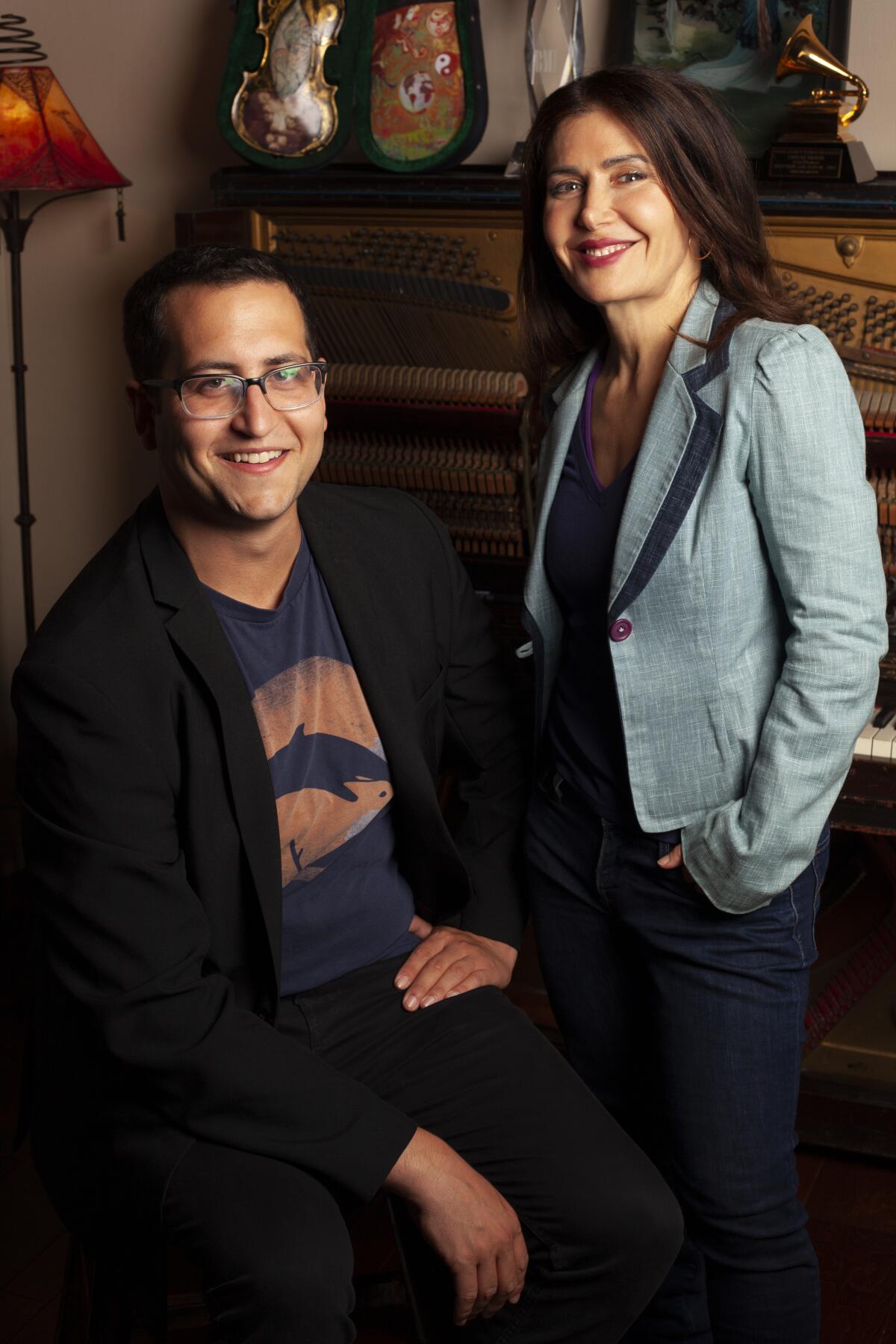
Lili Haydn, Ben Bromfield
“Marriage Is a Dungeon”
from “Ginny & Georgia” (Netflix)
The high school characters of “Ginny & Georgia” participated in another original musical in the latest season — this time a “Bridgerton”-inspired period piece called “Wellington.” Lili Haydn and Ben Bromfield, composers for the Netflix series, were tasked with writing something that mashed Jane Austen with classic Broadway.
They wrote five songs that embraced Bromfield’s love for Sondheim and Haydn’s for “West Side Story,” giving a theatrical showcase to the cast’s talented singers while also touching on character arcs happening in the show at large. Performed in the episode “Hark! Darkness Descends!,” the comical song, “Marriage Is a Dungeon,” touches on themes of “identity and authenticity and who are you without the approval of a man,” Haydn says.
The inspiration came from her grandmother’s “evil older sister.” In her last words to Haydn before she died, “she leaned in and said, ‘You think you know, but you don’t know — marriage is a dungeon.’ I realized that, for her generation and historically, marriage has actually been a dungeon for most women.”
Earlier in the episode, the character Max, played by Sara Waisglass, laments about not getting the lead role in the school production. Through ASL, her Deaf father tells her it takes unique talent to make people laugh — and her performance as a witch singing this song is the payoff.
“It was really fun to be able to bring these heavier themes in with a wickedly funny earworm,” says Haydn, “which was kind of like the triumph of art over pain.”
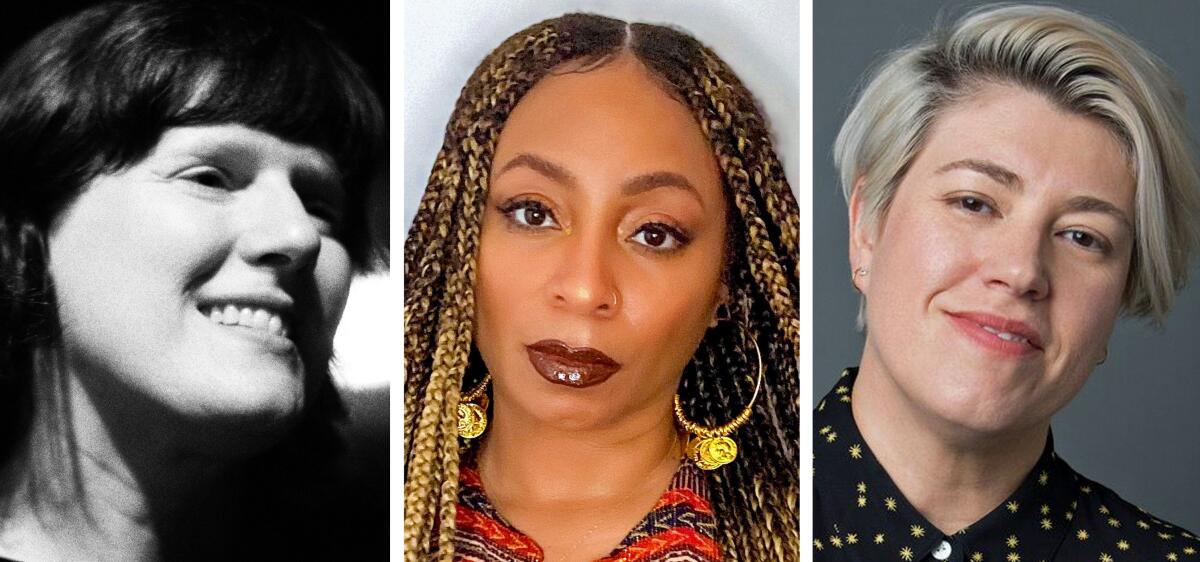
Heather McIntosh, Allyson Newman, Taura Stinson
“All About Me”
from “The L Word: Generation Q” (Showtime)
Broadway tunes are much more of an anomaly on “The L Word: Generation Q.” But showrunner Marja-Lewis Ryan is a huge musical theater fan, and she devised an episode — “Questions for the Universe” — where three of her characters have musical fantasies while on a hallucinogenic ayahuasca trip.
It was great fun for the show’s composers, Heather McIntosh and Allyson Newman, but “it was also a great place to really explore the interior motivation of these characters, and especially for Sophie,” played by Rosanny Zayas. “We really unlock some things with her with this song.” In her drug-dream sequence, which occurs on the set of a fictional 1950s sitcom, Sophie realizes that her needs have been routinely ignored and she belts out the “Wicked”-sized empowerment anthem “All About Me.”
Newman and McIntosh recruited Taura Stinson, who has co-written film songs for Mary J. Blige and Ariana Grande, to compose Sophie’s big number — complete with a rap — and they each put a bit of themselves into the song.
“We are the trifecta of what people bully and marginalize,” Stinson says. “I’m a Black woman. Ally’s a queer woman. Me and Heather are plus-size women. We’ve always been smooshed down, but it was time in this moment, in this song, to rise up and be our best selves.”
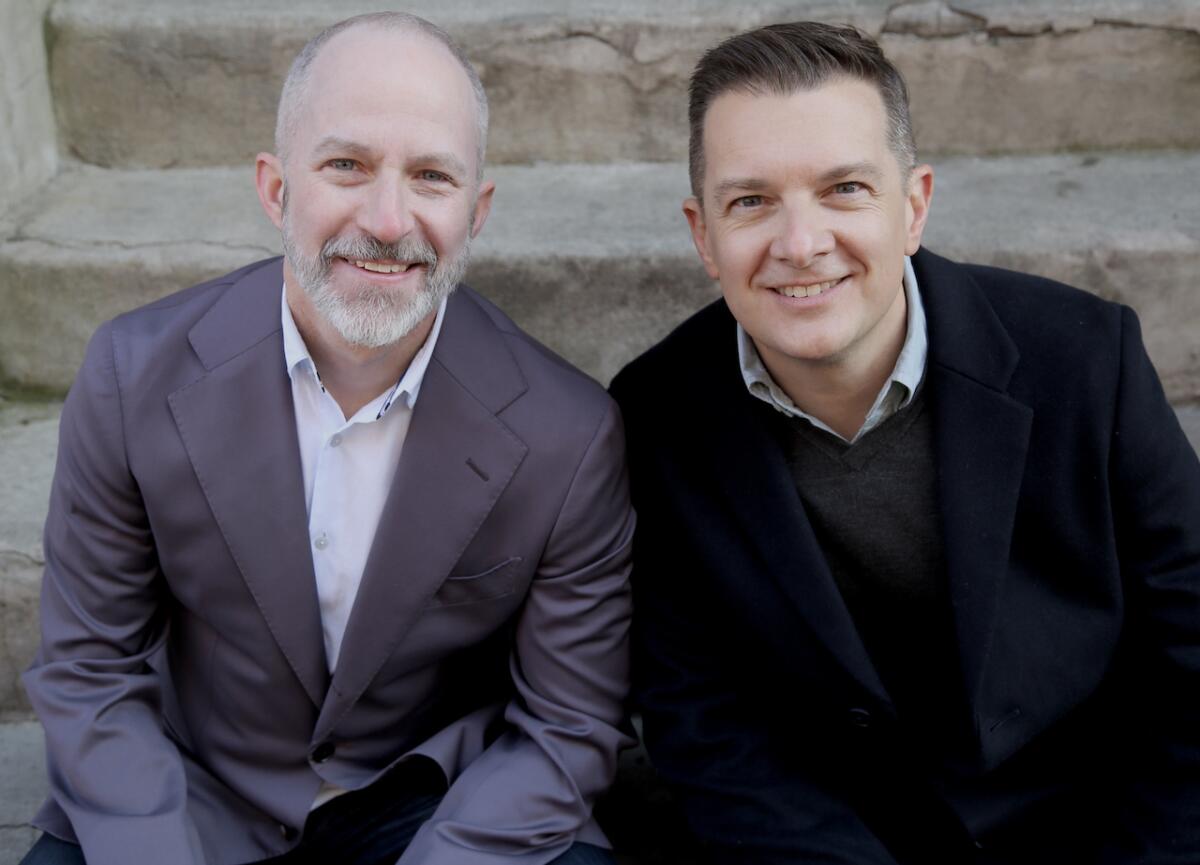
Thomas Mizer, Curtis Moore
“Your Personal Trash Man Can”
from “The Marvelous Mrs. Maisel” (Prime Video)
The musical within “The Marvelous Mrs. Maisel” had a very different purpose. In an episode partly inspired by the 2018 documentary “Bathtubs Over Broadway,” which detailed the history of industrial musicals, “Maisel” composers Thomas Mizer and Curtis Moore came up with their own version of Broadway-worthy showtunes to market a landscaping company and a dream kitchen, culminating in the industrial musical “Private Waste Management: A Musical Journey in Three Acts.”
The only difference between a 1960s industrial musical and a Broadway show was the subject matter, Mizer explains. “So you can go listen to Sheldon Harnick’s industrial about transmissions. The quality and the actors and the stagecraft was Broadway quality.”
In the episode “Susan,” Midge Maisel (Rachel Brosnahan) is roped into narrating a ridiculously high-value play where four New York garbagemen show up in a little boy’s bedroom and, in four-part harmony, sing the virtues of “Your Personal Trash Man Can.” Set to an upbeat tune in the key of Kander and Ebb, the song climaxes in a dance routine with trash can lids for tap shoes.
“To have to rhyme ‘private waste management,’ or get that as a lyric,” says Moore, “you’re just like, wow.” “I just wanted to die when I heard that,” Mizer says, laughing.
But they had a blast getting such a lavish stage for their songwriting and humor, and now they’re itching to do a whole musical with “Maisel” creator Amy Sherman-Palladino. Or, if not that, a real industrial musical.
“So if Aetna’s out there ...,” Mizer says — “We’re available!” Moore finishes.
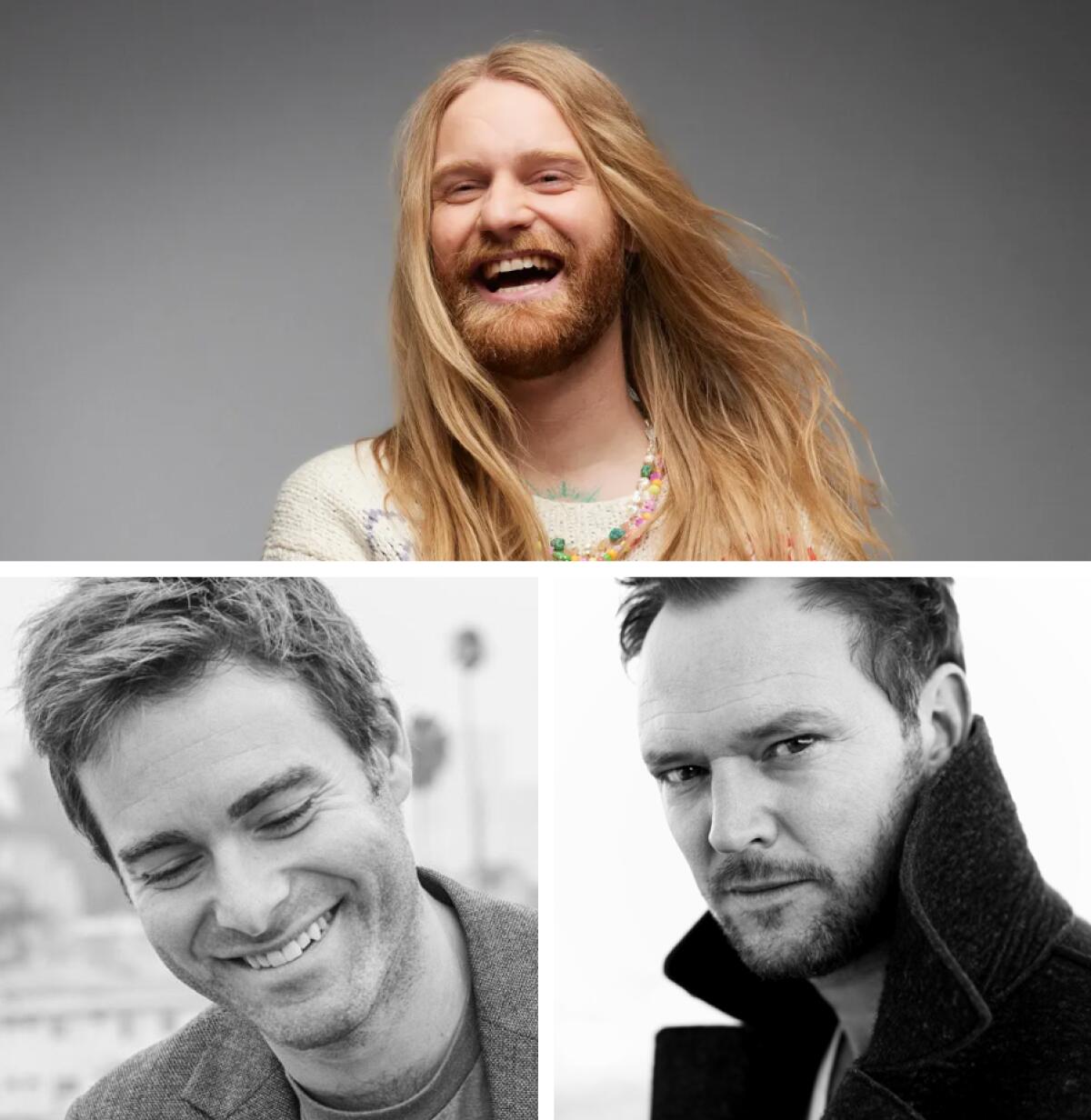
Tom Howe, Jamie Hartman, Sam Ryder
“Fought & Lost”
from “Ted Lasso” (Apple TV+)
Emmy darling “Ted Lasso” has two songs among the six nominees. In a series full of prominent needle drops, composer Tom Howe was jonesing to contribute an original song and saw his chance in the episode “Mom City” where it would accompany “what I would argue is the turning point/most important part in the entire show,” Howe says. “Ted’s decision to return home.”
Howe and songwriter Jamie Hartman had the germ of an idea for the song “Fought & Lost” when they reached out to singer-songwriter Sam Ryder, who blew up during the pandemic with his popular song covers on TikTok, and who sounds an awful lot like Freddie Mercury.
The line “Better to have fought and lost than never fought at all” is a familiar mantra, says Ryder, “but all of us will approach fighting and losing from a different place, like, what are the battles that you’ve fought, and what are the battles that you’ve lost? All of us have had to fail a considerable amount of time, and just to stay in the game and harness and foster some kind of semblance of belief that something would end up happening.”
The acoustic, Queen-like anthem — which actually features Brian May on guitar — fades in after Ted reconciles with his mother and heads into his coaching office. Howe took his experience scoring the entire series and working closely with star Jason Sudeikis, and poured it into the feeling and sentiment of the song — which also, “importantly, is a very natural performance,” Howe says. “Sam’s vocal is as good as they come and there is no clever editing or production tricks to improve the instruments or song overall. It’s authentic like the show and score.”
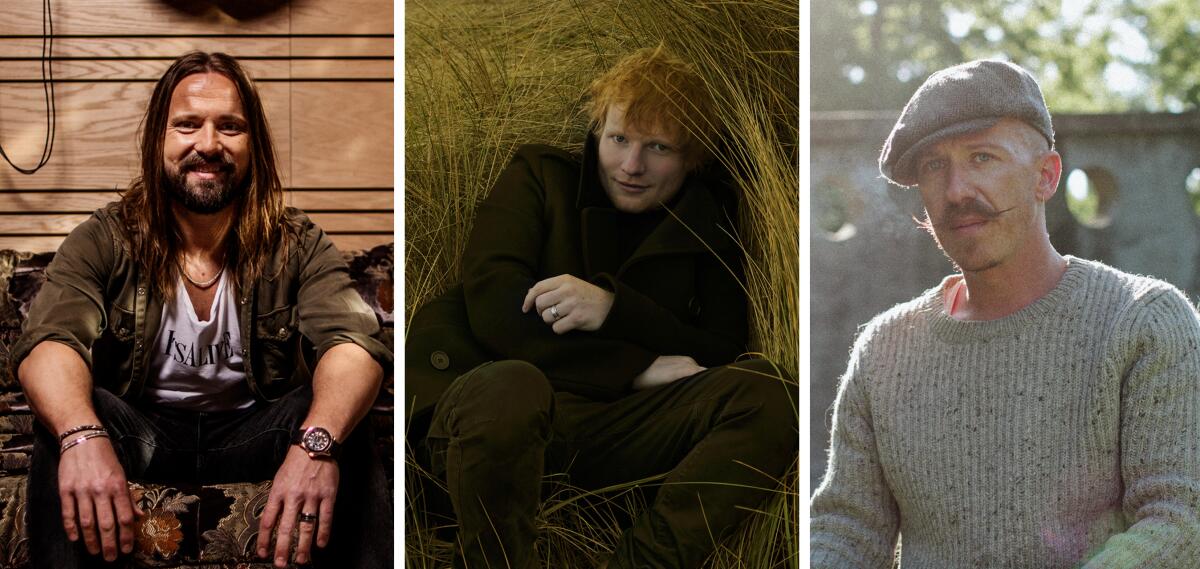
Ed Sheeran, Foy Vance, Max Martin
“A Beautiful Game”
from “Ted Lasso” (Apple TV+)
The final episode of “Ted Lasso” culminates with a song written by Ed Sheeran and his regular collaborator, Foy Vance. “A Beautiful Game” similarly sums up three seasons of emotions, but this one is heard by the football players inside the show — the soundtrack to a sentimental montage they watch right before the final match. That it makes them all weep as they take the pitch is played for laughs, but the song itself is no joke.
While Sheeran was a big fan, Vance had never seen the show — “but just about everyone I know that enjoys a good series was raving about it,” he says, “so I knew it must be good. It is hard not to be lulled by the hope and unabashed positivity of the Ted Lasso character.”
The duo was asked to write “a modern-day ‘Bohemian Rhapsody,’” which made them laugh — but “we knew what they meant,” says Vance, “so we disregarded trying to write one of the greatest songs of all time and just tried to write the best song for the show.”
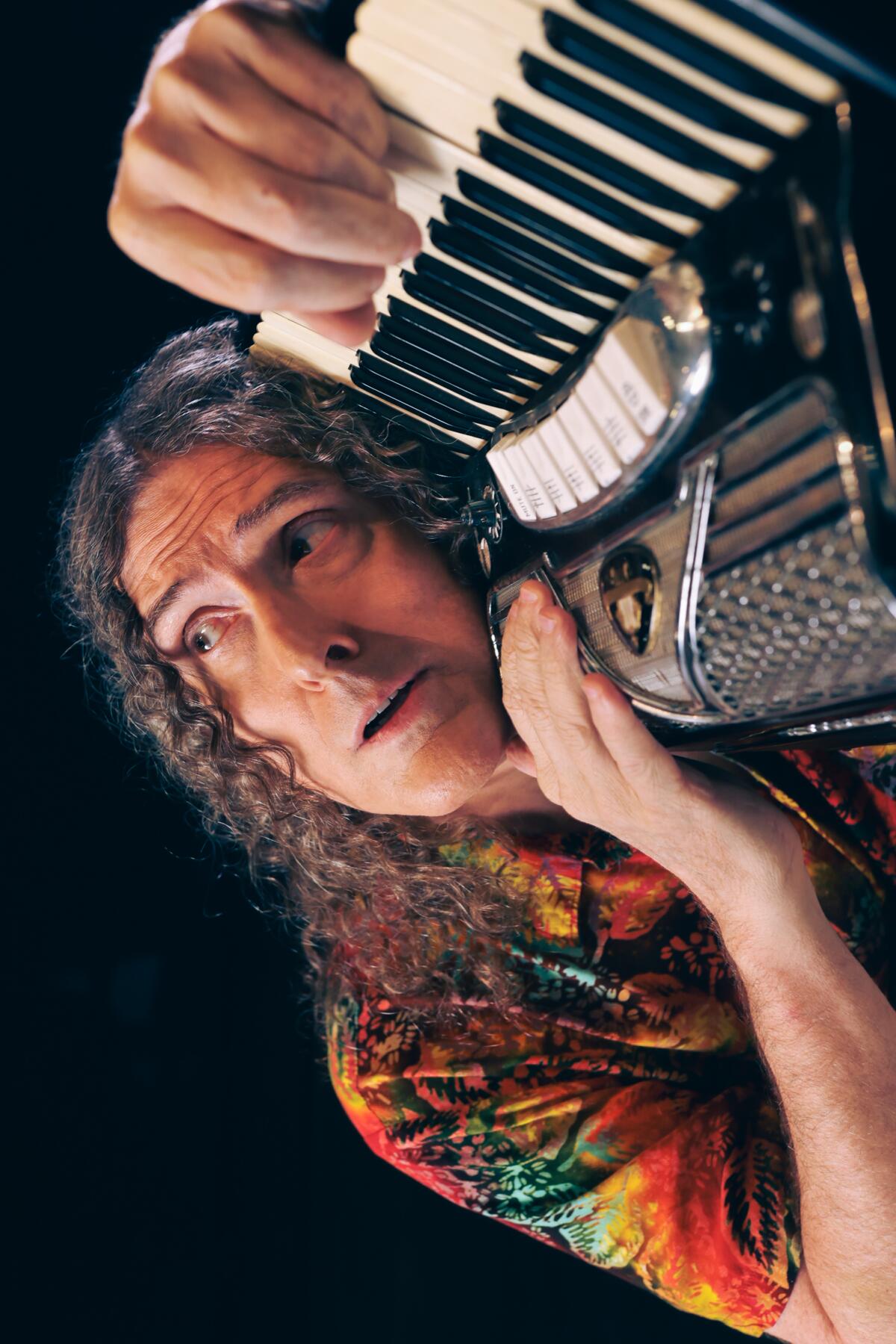
Al Yankovic
“Now You Know”
from “Weird: The Al Yankovic Story” (Roku)
Some songs written for TV and film become popular outside of their original context — but “Weird Al” Yankovic’s “Now You Know” makes zero sense divorced from the Roku original movie “Weird: The Al Yankovic Story.”
“Yeah, the truth came out, we finally removed all doubt, if it’s in a movie it’s gotta be true,” he sings in the end credits song — referring to two hours of lies and exaggerations the audience has just been playfully fed.
Originally, Yankovic thought about ending the film (after his incredibly fictionalized self, played by Daniel Radcliffe, is violently killed by Pablo Escobar’s cartel and then rises from the grave) with a slow, emo version of his parody song “Smells Like Nirvana” sung by someone like Adele. But the cost to license it was prohibitive for this small-budget film, so he wrote an original song and recorded it with his longtime band — who provided a blues rock drive and wailing saxophone solo, joined by a sizzling horn section and backup singers.
“I wanted to finish the movie with a bang,” Yankovic says.
The song literally references things in the credit crawl, which is impressive considering Yankovic recorded it before the credits were made. Director Eric Appel insisted on keeping the song’s two fakeout endings.
“Now You Know” leans into the goofiness of the film — and of Yankovic’s oeuvre — insisting that everything in the plot really happened. “This movie is now canon,” Yankovic sings, “every word is true, I swear.”
He even prophesied this nomination — though off by one academy — singing, “This song is technically eligible for Oscar consideration.”
“I wrote that hoping that I’d be able to twist some arms at Roku so that they’d put it in a theater in L.A. for a week and actually make it Oscar eligible,” Yankovic says. “But that did not happen. So that is the one lie in the movie.”
Our BuzzMeter panel of veteran TV journalists predicts the winners in 14 categories of the 2023(?) Emmys. You can, too, in our weekly polls.
More to Read
From the Oscars to the Emmys.
Get the Envelope newsletter for exclusive awards season coverage, behind-the-scenes stories from the Envelope podcast and columnist Glenn Whipp’s must-read analysis.
You may occasionally receive promotional content from the Los Angeles Times.



